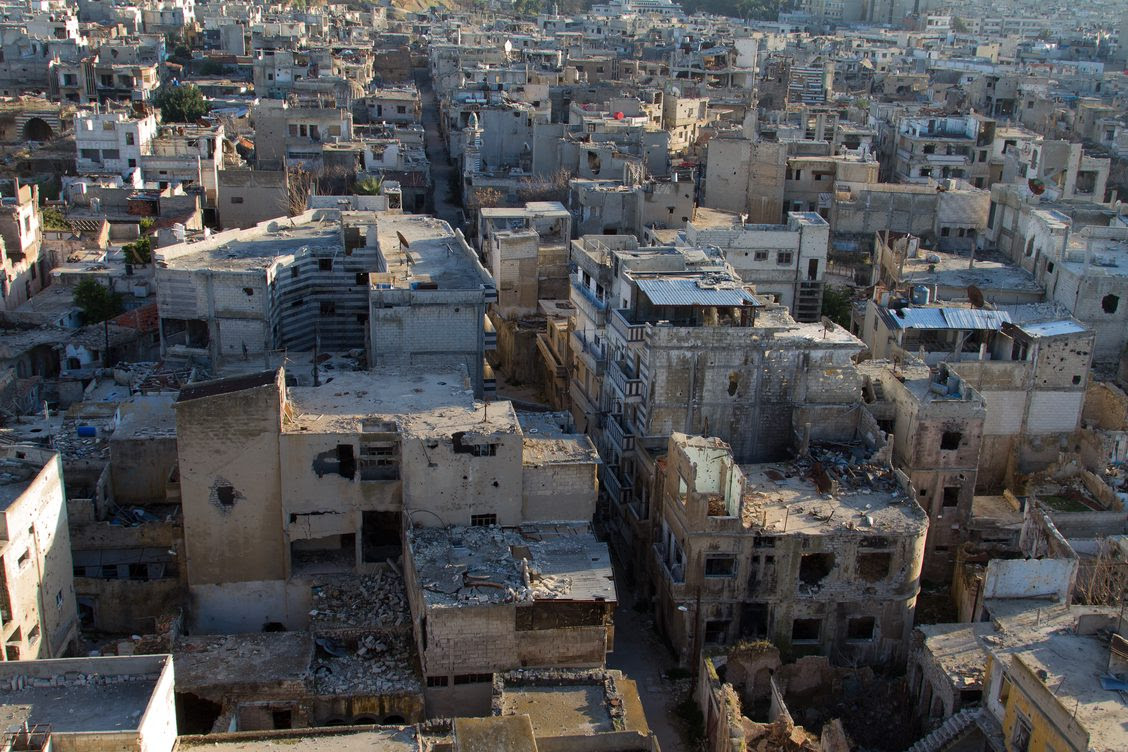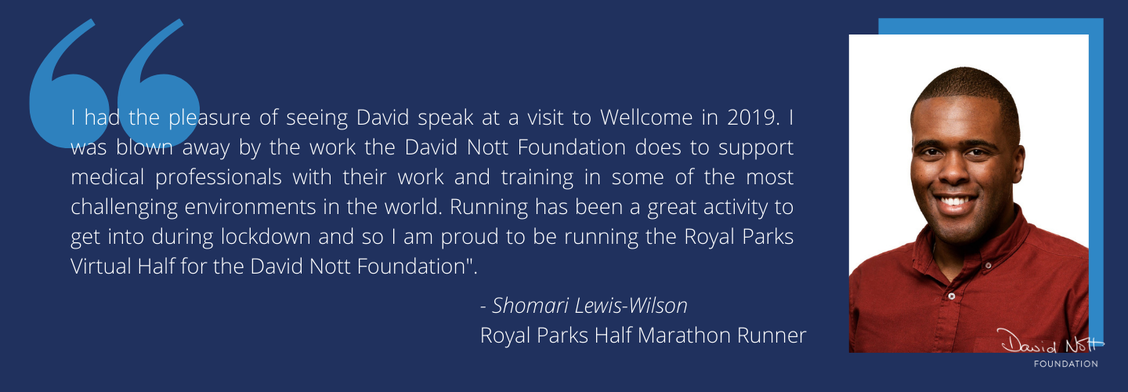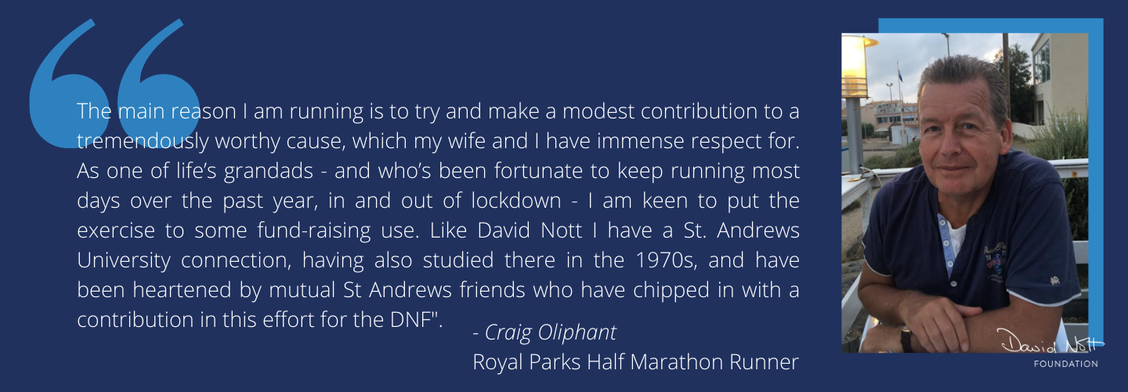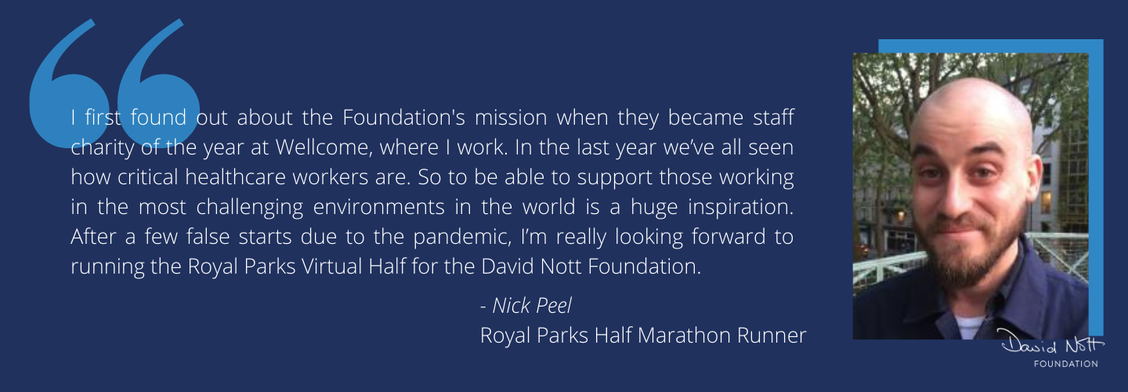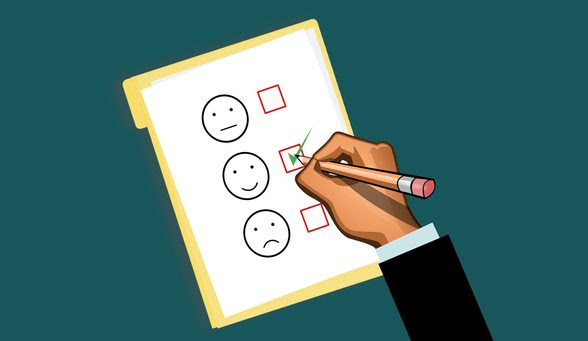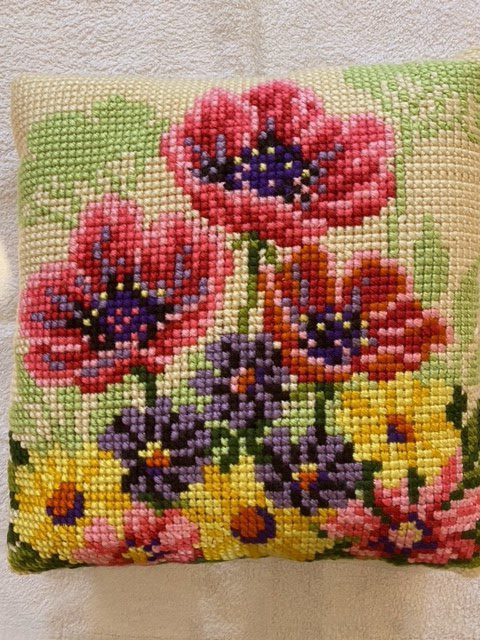April 2021 Newsletter: 10 Years of Conflict in Syria

10 Years of Conflict in Syria
Welcome to the David Nott Foundation’s April update. To those observing, we hope that you had a restful Easter and were able to come together with loved ones to celebrate. Today, we at the Foundation have been profoundly saddened by the new that His Royal Highness The Prince Philip has passed away. We wish to express our deepest condolences to Her Majesty The Queen, and the Royal Family. It has now been ten years since the civil war erupted in Syria. The price paid over the last terrible decade by Syrian civilians is incalculable, and millions still reside in vulnerable, crowded camps. Children have lost schools, friends and family members. So many thousands have lost their homes, businesses and loved ones. Hospitals, deliberately targeted by the Syrian regime now struggle to cope with the COVID-19 pandemic. As a show of solidarity with the Syrian people, the David Nott Foundation dedicated our social media accounts to small NGOs, individuals, civilians, humanitarians and journalists who have lived experience of the civil war. We hoped to provide a platform through which to amplify these voices. We encourage you to look back through our Tweets and Re-Tweets (@NottFoundation) to read first-hand accounts of the atrocities and reflect on the profound loss that we all feel after ten years of conflict. The David Nott Foundation has taken our HEST® course to Syrian surgeons before, and plans to again soon. You can view an interactive map of where we have taken our training course by visiting the ‘Overseas Course’ section of our website. Good luck to our RPHM RunnersWhile we’re on the subject of challenge running events, the Foundation would like to wish good luck to our Royal Parks Virtual Half Marathon runners for the 11th of April. We asked some of those competing to raise money for the DNF what inspired them to do so:
|
||||||||||||||||||||||||
Cycling across Europe!
Beginning on 1st September, a group of friends from the USA and the UK, will be taking on the “challenge and opportunity of a lifetime” to raise funds for the David Nott Foundation and STAR, Inc.
Led by Tony Williams and Tom Nero, the team had planned to cycle Route 20, the longest road in the US, starting in Massachusetts on the east coast and finishing in Oregon on the west. However, due to Covid-19 movement restrictions being imposed in various states, the itinerary had to be rearranged and the team are now circum-cycling Italy.
The route will take the team from Milan, anti-clockwise around Italy. The distance is over 2,000 miles with 19 miles of ascent, making it the toughest challenge event taken on for the DNF so far!
The team have set an ambitious target of $250,000 to match the extraordinary scale of this challenge.

As they prepare for “Over 3,000 miles of saddle soreness,” Tony is proud to announce, “With only two months to go till we start our cycle ride, I am very excited that we now have pledges and donations exceeding $157,000 (split almost equally between the US and the UK charities). This is HUGE and a true reflection of the worthy causes we are supporting. A $50,000 challenge gift will match future donations up to that amount.”
We are completely bowled over by their support and cannot wait to update you on their journey across Europe. The team have also set up their own website dedicated to bringing you the latest news on their once-in-a-lifetime trip. Check it out by clicking here.
If you're feeling inspired, please get in touch with your own fundraising challenges - we love to hear from you!
War Doctor Heroes: Meet Dr Marah
Dr Marah, a medical student from Homs, Syria knows that no matter how young a physician is, they should always be updated with the best skills and practices.
The shortage of medical staff, surgical equipment and training programmes are significant barriers to quality healthcare in her region, and these problems are worsened by a poor socioeconomic situation.
After studying medicine for only two years, Marah assisted in a Mastectomy operation on a fifty-year-old woman. Owing to the anaesthetist’s lack of experience, the patient was not under good anaesthesia and experienced a great deal of pain during the procedure. Although Marah was very anxious, she looked after the patient and decided that surgery was what she wanted to do for the rest of her life.
In 2019, we invited Marah to attend our overseas HEST® course in Lebanon where she was taught how to perform many complex surgical procedures and was able to build up her confidence. She told us that the training course inspired her to “use every source of power I have to help the patients and that no matter how hard the situation is we should always remember that patients must be our first priority.”
Marah hopes her country finds peace soon and believes that by working together and supporting each other, her people can improve their future. We are confident that Marah will make a brilliant surgeon and we are proud to be supporting her on this journey.
War Doctor Heroes: Meet Dr Ayman
Meet Dr Mohammed Ayman, a Syrian vascular surgeon and our latest War Doctor Hero.
We first met Ayman back in 2013, when David Nott was volunteering in Alzarour Hospital, Aleppo. Whilst treating patients, David was able to teach Ayman and his team a variety of specialised surgical procedures that Ayman was later able to use to save casualties.

At this time, medical workers and facilities were a target. As Ayman put it, "the hospitals in Aleppo were a kind of magnet for attacks.”
It was too dangerous to go outside as barrel bombs and missiles could fall at any time so Dr Ayman and his colleagues had to work, sleep and eat in their underground hospital.
The heavy siege also meant resources were always in short supply. They lacked the right sutures to stitch up patients and there wasn’t enough food and milk to feed malnourished children. Nonetheless, Dr Ayman did what he could to take care of his patients. “All the Syrian people in Aleppo needed us, so we had to be stronger for them and we had to adapt to the new situation as best we could. We wanted them to always feel that they were not alone.”
One patient that Ayman especially remembers was an 11 month old baby girl. Her father carried her to the hospital after she was wounded in a bomb explosion. She had a severe leg wound and the orthopaedic surgeon wanted to perform an amputation. Fortunately, Dr Ayman knew there was a chance her leg could be saved. He successfully performed a vein bypass to restore the blood supply and later her leg was externally fixated so that the bone could heal properly.
To Ayman’s immense happiness, the little girl recently started walking.
Ayman is one of fourteen surgeons who will be joining us for our next UK-based training course. He hopes that the skills learnt on this course will enable him to better serve the Syrian people when he is able to return to his home country.
You can read about some of our other War Doctor Heroes by clicking here.
War Doctor Heroes: Meet Dr Koma
We are delighted to feature Dr Koma Akim, a general surgeon from South Sudan, as our latest War Doctor Hero.
South Sudan is the world's youngest sovereign state, having gained its independence from Sudan in 2011.
Since December 2013, the country has been embroiled in a civil war that has resulted in the displacement of more than 4 million people, and contributed to the endemic poverty that affects 80% of the population. Conflict between nomadic people, particularly over the issues of cattle and grazing rights, has compounded the violence, yet health resources and medical professionals remain scarce.
Dr Akim is one of only a handful of general surgeons in the country, and regularly deals with gunshot and arrow wounds as a result of cattle rustling. Those who make it to his hospital are often in a very bad way, suffering from internal bleeding and broken bones. Without any advanced orthopaedic instruments, Koma must often treat these fractures non-operatively, even though his patients would benefit from external fixators or skeletal traction.
Alongside his work in the district hospital, Dr Akim has also undertaken humanitarian missions in Ganyiel, in the Unity State of South Sudan. Koma recalled performing an emergency C-section for a retained second twin in the midst of the fighting here. In spite of the high maternal mortality associated with this complication, Dr Akim was miraculously able to save the lives of both the mother and her two babies.
These experiences motivated Koma to learn more and enhance his skill set, so that he could continue to alleviate the suffering of ordinary people in his country.
In 2019, Dr Akim attended our London based Surgical Training for the Austere Environment course (STAE). On this training programme, he learnt how to properly expose blood vessels and said “being able to practise it means I have the confidence to do it in a real situation. If I can do it, I can teach it.” This skills-sharing is a vital part of what we as a Foundation hope to achieve. By training one doctor on our course, we give them the knowledge and skills needed to teach countless more.
It is Koma's ambition to become a role model for the next generation of South Sudanese doctors. He hopes to inspire more to become surgeons in order to better serve the people of war torn South Sudan and told us that "my skills and theirs will be more needed here, in South Sudan, than anywhere else in the world."

To help us train more surgeons like Koma, you can make a donation here.
Yemen HEST® January 2020
The DNF team, in partnership with MSF Spain, recently returned from our latest mission to Yemen which brought in 31 surgeons from across the country for a specialised five-day training course. Since 2015, Yemen has been the stage of one of the world's worst humanitarian catastrophes. Hundreds of thousands of Yemeni citizens have already lost their lives, and as the fighting continues, many more are in need of urgent medical treatment and supplies. At the front-lines of this conflict are the surgeons and medics who face the challenge of saving lives without losing their own, all the while limited by a lack of resources and insufficient training.
Our Hostile Environment Surgical Training course (HEST®) was designed to confront this problem. Over the course of five days, our Faculty, comprising David Nott, Ammar Darwish, Pippa Letchworth, Pete Mathew and Rebekka Troller instructed surgeons on a wide range of trauma topics. By equipping these medics with the necessary knowledge, confidence and skills that they need to treat patients, we can improve the medical outcome for countless people.

The regions where HEST® is taught often rule out cadaveric teaching, so the Foundation’s whole body simulator, Heston®, was employed for training. This state of the art, bespoke simulator mimics the look and feel of real human flesh and features the full range of organs, blood vessels and key anatomies needed for facilitating learning.

Supporting Heston®, we also deployed our neonatal models and our new VR learning experience, which simulates a mass casualty event. This immersive experience focuses on the triage of ten patients using International Committee of the Red Cross categories: serious wounds, second priority, superficial wounds and severe wounds.

To date, the Foundation has trained 803 medics across 28 courses, benefiting an estimated 1.7 million patients. Through this global network of war doctors, we can raise the standard of medical care worldwide and continue to save more lives and limbs. To help us train even more surgeons, you can donate here.
War Doctor Heroes: Meet Dr Lucien
Our global network of #wardoctorheroes is at the heart of everything the foundation strives to achieve, and we are proud to introduce Dr Lucien Wasingya Lusenge from Uganda in this latest instalment.
When Lucien was just 3 weeks old, he contracted a febrile disease and his health deteriorated rapidly. His family were beginning to lose hope, and he was referred to another hospital 20km away.
It was here that a volunteer from MSF correctly diagnosed Lucien and successfully treated him in under a week. Lucien's father told him this story dozens of times as he was growing up, inspiring Lucien to become a surgeon and dedicate his own life to saving others.
In April of 2018, the Foundation awarded Lucien a scholarship to come to London and attend our specialised course, Surgical Training for the Austere Environment (STAE). The course greatly boosted Lucien's confidence in dealing with trauma patients and improved his decision-making skills for surgical emergencies. Lucien said, "After only five days, I was able to gain the confidence to handle surgical, obstetric and gynaecological emergencies with limited equipment and resources."
The skills learned on this training course have enabled Lucien to save the lives of countless people, including many victims of traffic collisions on Masaka Road, a dangerous stretch of highway that claims 200-300 lives annually.
In September, Lucien was able to journey to London once again to present his research, and paid David Nott a visit, to thank him in person.

The courage, dedication, and selflessness of doctors like Lucien inspires everything that the Foundation works for, but we cannot do it alone. You can help us to train even more surgeons and save more lives by donating today, and spreading awareness.
War Doctor Heroes: Meet Dr Youssef
In this latest instalment of our #wardoctorheroes series, we're proud to introduce Dr Youssef Saab from Lebanon, a surgeon who works just 3km from the Syrian border.
We first met Youssef in 2018, when he attended our overseas HEST® course in Beirut. On this specialised surgical training course, Youssef learnt the importance of damage control when dealing with mass casualty incidents. Since then, he has implemented this procedure five times to great success, saving the lives of many patients. Inspired to join MSF, Dr Saab now sees between 50-60 patients each day in the Bekaa Valley refugee camp, close to the border.
Unfortunately, the majority of his patients are child refugees, who, having fled from war, now deal with chronic wounds and burns. As Youssef explained: "War is not just about the acute wounds. Wounds that have not been properly treated, which become infected or that fail to heal properly can be just as deadly."
Alongside these chronic wounds, electric shocks and hot water burns are also commonplace as conditions in the refugee camps remain hazardous, especially for young children.
Dr Youssef recently joined us on our London based STAE course, where he was able to enhance his knowledge across several key areas, including trauma obstetrics, plastic surgery and orthopaedics.
Our War Doctor Heroes series celebrates our global network of surgeons, working in some of the world’s most hostile and austere environments. Their selflessness and bravery inspires everything that the Foundation strives to achieve.
To help us train more surgeons like Youssef, you can donate here.
Taking on the Royal Parks Half Marathon
On 13th October, six runners took on the Royal Parks Half Marathon and were successful in raising over £10,000 for the David Nott Foundation. Their dedication and perseverance means we are now able to fund the training of ten more surgeons working in austere environments. Read more about our fantastic runners below.
Anna-Lucia

A 6th year medical student at the University of Cambridge, Anna-Lucia has a passion for global surgery and has wanted to be a surgeon since before she even applied to med school. Whilst going on runs to train for her first half marathon last March, Anna-Lucia listened to the War Doctor audio book. She was so enthusiastic about it, that she made her entire family read the book and bought it for friends as a birthday present.
Sima

67 year old Sima also took on the 13.1 mile course in support of the Foundation. Though she has previously completed a whopping nine full marathons, this was her first half marathon in five years.
Ameera

Over the last four years, Ameera, a senior A&E nurse, has volunteered with various organisations and has taken unpaid leave with the NHS to work in Lesvos, Iraq and Macedonia. Whilst looking for new NGOs to volunteer with, Ameera came across David's book and was unable to put it down. She was even able to meet David in person at a book signing back in July!
She told us: "David’s experiences and drive to improve training for surgeons in countries of war, conflict and poverty is what motivated me to run for the foundation."
As an added challenge, Ameera also ran the 13.1 mile course in a surgical gown and cap!
Lindsey

After stumbling across David's Desert Island Discs a few years back, Lindsey was deeply touched by Dr Nott's humility and compassion. A medic herself, she said: "Like David I, too, as a senior GP see no borders, no one person better than any other."
Caitlin

Since the Foundation was first started by David and Elly in 2015, Caitlin has been working behind the scenes for us, and is one of our valued trustees. Faced with the frightening prospect of running non-stop for two hours, Caitlin nonetheless emerged victorious and crossed the finish line at 2 hours 13 minutes. You can read more about the work that Caitlin does for us here.
Jamie

As David and Elly's neighbour, Jamie has long been a supporter of the David Nott Foundation and we are very grateful for everything he has done for us over the years. An avid long distance runner, Jamie managed to finish the 13.1 mile course in an incredible 1 hour 29 minutes!
We are always excited to hear about anyone taking on a challenge event for the Foundation, so please don't hesitate to get in touch! If you'd like to learn more about how you can fundraise for us, please visit out Get Involved page.





